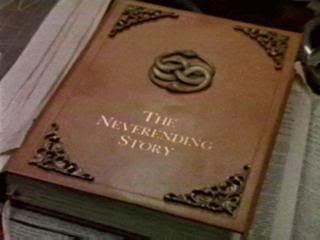Tenacious D in the Pick of Destiny (L. Lynch, 2006)
The remarkable thing about Tenacious D is that, despite obviously being a joke band, they are actually capable on occasion of achieving a bizarre death-folk nirvana. It's no wonder that the fictional versions of Jack Black and Kyle Gass spend so much time trying to catch lightning in a bottle. Most of the time, the two sound like a pair of goofs messing around after a night of mind-altering substances. But every once in a while - honest to goodness - the music actually soars and the two create a distinctive sound that is no less awesome for its copious references to medieval mythology and explicit sex.
Perhaps Tenacious D in the Pick of Destiny is all the more disappointing because it gives us glimpses of the glorious film that could have been. In the opening sequence, quite obviously inspired by The Who's Tommy, a young Jack Black rocks the family dinner, upsets his Christian father and pledges his loyalty to Ronnie James Dio. The tone, the energy, the humor, the music - everything is pitch perfect. This is what the Tenacious D film needed to be - an overblown rock opera emulating (and topping) the excesses of their idols. Instead, the film soon drops its ambition and slides into a half-baked stoner comedy complete with mandatory cameos by Ben Stiller and Amy Poehler.
The D will probably never have another chance at making a feature film, so it is a shame that they settled for lame kung-fu parody, an uninspired hallucinogenic sequence and a gratuitous car chase. Most of this is transparent filler as we await the unavoidable confrontation with Satan himself. The film once again enters rock opera mode and immediately recaptures our attention. This is the D we need to see. We need nothing short of our minds completely blown. In the film's final scene, we get an ultra lame bong joke, followed by an after-the-credits fart gag. Not good enough. When watching the D, our level of enjoyment directly correlates to their level of mad ambition.
[**]
Perhaps Tenacious D in the Pick of Destiny is all the more disappointing because it gives us glimpses of the glorious film that could have been. In the opening sequence, quite obviously inspired by The Who's Tommy, a young Jack Black rocks the family dinner, upsets his Christian father and pledges his loyalty to Ronnie James Dio. The tone, the energy, the humor, the music - everything is pitch perfect. This is what the Tenacious D film needed to be - an overblown rock opera emulating (and topping) the excesses of their idols. Instead, the film soon drops its ambition and slides into a half-baked stoner comedy complete with mandatory cameos by Ben Stiller and Amy Poehler.
The D will probably never have another chance at making a feature film, so it is a shame that they settled for lame kung-fu parody, an uninspired hallucinogenic sequence and a gratuitous car chase. Most of this is transparent filler as we await the unavoidable confrontation with Satan himself. The film once again enters rock opera mode and immediately recaptures our attention. This is the D we need to see. We need nothing short of our minds completely blown. In the film's final scene, we get an ultra lame bong joke, followed by an after-the-credits fart gag. Not good enough. When watching the D, our level of enjoyment directly correlates to their level of mad ambition.
[**]


